
Ray Edward Cochran, known professionally as Eddie Cochran, was an American rock and roll musician. His songs, such as "Twenty Flight Rock", "Summertime Blues", "C'mon Everybody" and "Somethin' Else", captured teenage frustration and desire in the mid-1950s and early 1960s. Cochran experimented with multitrack recording, distortion techniques, and overdubbing, even on his earliest singles. Cochran played the guitar, piano, bass, and drums. His image as a sharply dressed and attractive young man with a rebellious attitude epitomized the stance of the 1950s rocker, and in death, Cochran achieved iconic status.

"Summertime Blues" is a song co-written and recorded by American rock artist Eddie Cochran. It was written by Cochran and his manager Jerry Capehart. Originally a single B-side, it was released in August 1958 and peaked at number 8 on the Billboard Hot 100 on September 29, 1958, and number 18 on the UK Singles Chart. It has been covered by many artists, including being a number-one hit for country music artist Alan Jackson, and scoring notable hits in versions by Blue Cheer, the Who and Brian Setzer, the last of whom recorded his version for the 1987 film La Bamba, in which he portrayed Cochran.

"Twenty Flight Rock" is a song originally performed by Eddie Cochran in the 1956 film comedy The Girl Can't Help It, and released as a single the following year. The song was published in 1957 as written by Ned Fairchild and Eddie Cochran, by American Music Incorporated and Campbell, Connelly and Company. Cochran's contribution was primarily on the music. His version is rockabilly-flavored, but artists of a variety of genres have covered the song.
Jerry Neil Capehart was an American songwriter and music manager. Capehart co-wrote the songs "Summertime Blues" and "C'mon Everybody" with Eddie Cochran, whom he also managed. One of his most-recorded songs, "Turn Around, Look at Me," was a chart hit for Glen Campbell, the Lettermen, and the Vogues.

"C'mon Everybody" is a 1958 song by Eddie Cochran and Jerry Capehart, originally released as a B-side.

Bolan Boogie is a compilation album by the English glam rock band T. Rex. After Marc Bolan had left Fly Records to form his own label distributed through EMI/T. Rex Wax Co, his former label released this compilation in 1972 with recent single A- and B-sides recorded in 1970 and 1971, many of which had not appeared on previous albums. Also included are album tracks from Tyrannosaurus Rex's Unicorn (1969), A Beard of Stars (1970) and T. Rex's T. Rex (1970).

The Flying Lizards is the 1980 debut album by The Flying Lizards and was released on the Virgin Records label.

The Who Collection is a compilation album by The Who, released in 1985. It is notable for containing a unique remix of "Won't Get Fooled Again" and for being one of the few compact disc appearances of the extended version of "Magic Bus".

The Story of The Who is a 2-LP compilation album from the Who. The album was released in the UK in September 1976. The album reached number two in the UK charts. Another version of this collection with a different track listing was also released in Japan. This collection has not been released on CD.

The Beast Is Back is the seventh album by a newly reformed Blue Cheer, 13 years after their previous album, Oh! Pleasant Hope (1971). It contains re-recorded versions of some of the band's most popular songs from their late-1960s heyday as well as new material. The album features founding members Dickie Peterson and Paul Whaley. Original guitarist Leigh Stephens did not participate in the reunion.
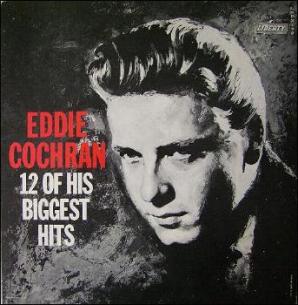
The Eddie Cochran Memorial Album is the second album by Eddie Cochran, released on Liberty Records in mono, LRP 3172, in May 1960. It had previously been issued as 12 of His Biggest Hits in April 1960 with the same catalogue number, but after Cochran's death on April 17 it was retitled and reissued, and has remained so titled ever since. It is currently in print on the Magic Records label in France, on CD on EMI-Toshiba in Japan, and on BGO in the UK as a twofer with "Singin' To My Baby."

The Singles is a compilation of singles by The Who that was released by Polydor in November 1984. It was not released in the United States or Canada, and it lacks a number of early singles.

Amazing Journey: The Story of The Who is a compilation of songs featured in the documentary of the same name. This soundtrack was only released in Best Buy stores in the United States.
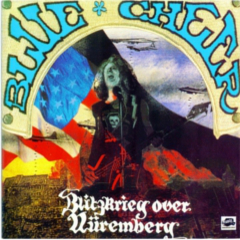
Blitzkrieg Over Nüremberg is the first live album by American blues-rock band Blue Cheer. It features a cover of Jimi Hendrix's classic "Red House".
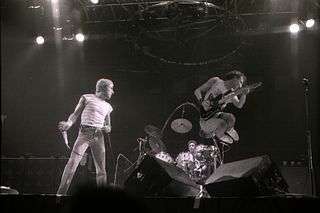
The Who Tour 1980 was The Who's second concert tour since the death of original drummer Keith Moon, supporting their 1978 album Who Are You.

Never to Be Forgotten is the third album by Eddie Cochran and the second album posthumously released in the US after Cochran's death in 1960.

The Very Best of Eddie Cochran is the fifth album posthumously released in the US after Eddie Cochran's death in 1960.
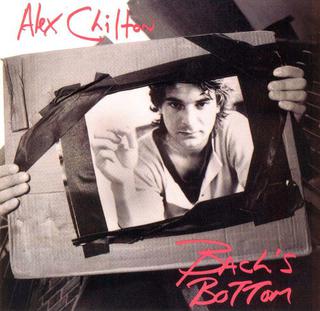
Bach's Bottom is the second solo album by American pop rock musician Alex Chilton, released in 1981. Bach's Bottom was recorded in September and October 1975 at Ardent Studios in Memphis, Tennessee.

"My Way" is a song co-written and recorded by Eddie Cochran. It was recorded in January 1959 and released posthumously as a single on Liberty Records in April 1963. In the UK the single reached number 23 on the charts.
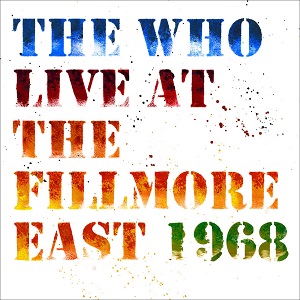
Live at the Fillmore East 1968 is a live album by the English rock band The Who. It was recorded at the Fillmore East, New York City on Saturday 6 April 1968 and released on 20 April 2018 as a double album on CD, and a triple album on LP.


















